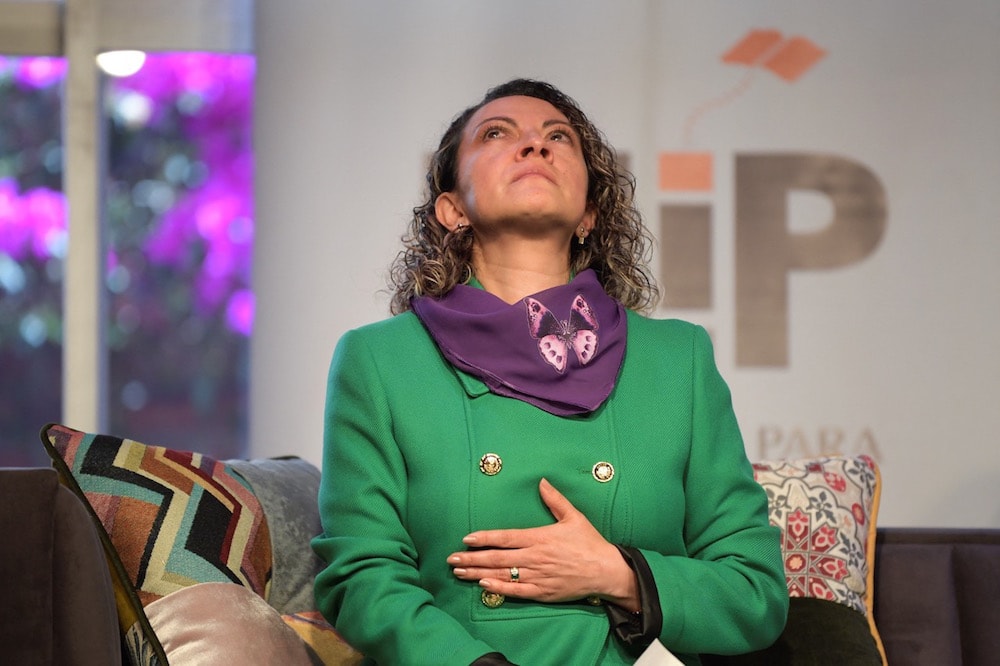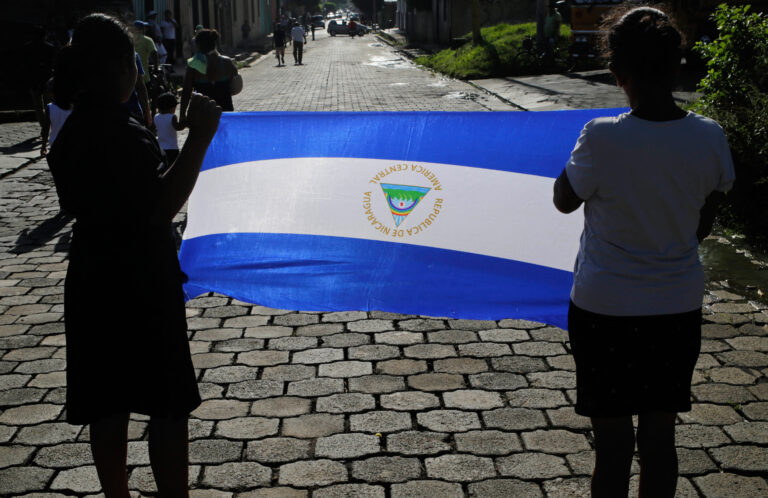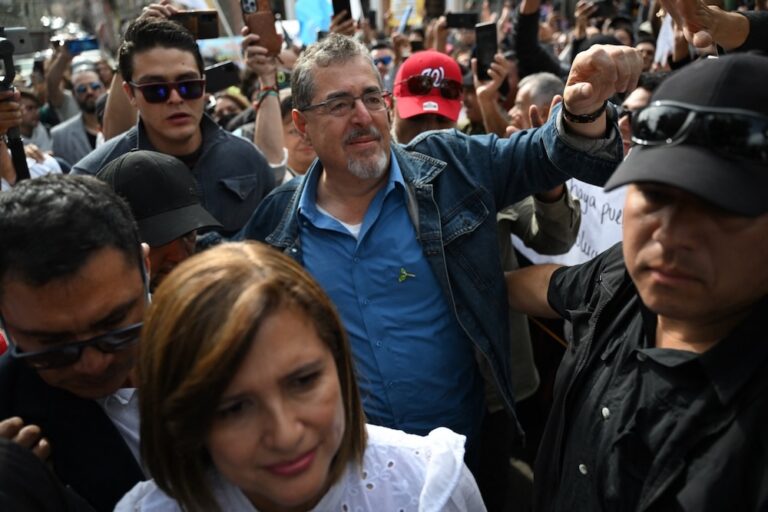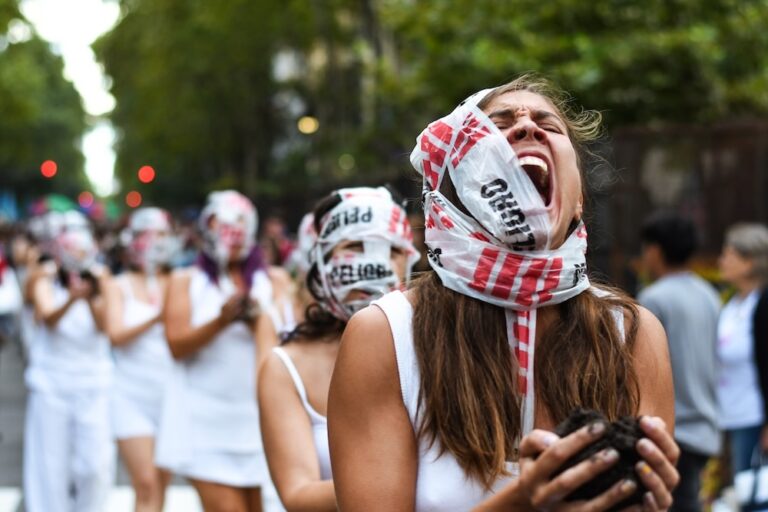October 2021 in the Americas: A free expression round up produced by IFEX's Regional Editor Paula Martins, based on IFEX member reports and news from the region.
The vindication of the rights of women journalists
This October, the Inter-American Court of Human Rights (IACtHR) found the State of Colombia responsible for the violation of the rights to personal integrity, personal liberty, honour, dignity and freedom of expression of journalist Jineth Bedoya Lima, as a result of the events that took place on 25 May 2000. That day, while covering organized crime activities taking place inside the La Modelo prison in Bogotá, with the involvement of state agents, Jineth was kidnapped and later subjected to torture and sexual violence.
The Court’s decision was groundbreaking, for it analyzes for the first time the use of sexual violence as a form of silencing and controlling a woman journalist in the framework of the Colombian armed conflict. Another important element of the decision is that the Court found that the attacks against the journalist not only violated her freedom of expression at the individual level, but also had a collective impact – both on Colombian society as a whole, limiting its right to information, and on other individuals who practice journalism, given the chilling effect it generated.
The Court ordered a series of reparation measures including symbolic measures and guarantees of non-repetition in order to repair the damages caused to Jineth Bedoya and society at large.
Among other measures, the Court ordered the State of Colombia to develop “a comprehensive policy for the protection of journalists”, as well as to design and implement a public system for collecting up-to-date facts and figures on gender-based violence and on threats and violence against journalists and human rights defenders.
Bedoya, who has been pursuing justice in her case for over 21 years and now campaigns against sexual violence, stated that the decision represented “the vindication of the rights of thousands of women victims and survivors of sexual violence and of women journalists who lay down part of their lives to their profession.”
The organizations representing the case in the international process were IFEX-ALC member Fundación para la Libertad de Prensa (FLIP) and the Center for Justice and International Law (CEJIL). You can watch the press conference they organized with Jineth when the sentence was announced, here.
The risks of surveillance in Latin America
A number of Latin American organizations, including IFEX-ALC members FLIP, Fundación Karisma, ARTICLE 19 México y Centroamérica, Red en Defensa de los Derechos Digitales (R3D), and Derechos Digitales, requested a hearing at the Inter-American Commission on Human Rights (IACHR) to express concern over the growing deployment of surveillance technology in the region.
According to these groups, the use of surveillance tech has been spreading in the region as a response to a wide range of social challenges, including public safety, border control, pandemic response, monitoring of social protests, access to public services, among others – without a proper assessment of their impact, which includes illegitimate restrictions on rights such as privacy, freedom of expression and assembly, and equality.
They flagged the growing capacity of intelligence services to use technology to target activists, dissidents, and human rights defenders. Growing technical capabilities for the interception of communications in criminal investigations was also pointed out as a concern, given that they occur under outdated regulations, without adequate oversight, and with no limitations concerning their scope and extent. The situation of data and metadata retention by internet service providers, which are then used indiscriminately by government agencies, was also raised.
Among the final requests presented by the petitioners to the IACHR is the launching of a regional consultation process to establish a set of Inter-American guidelines to steer the processes of acquisition and use of technologies with surveillance capabilities – based on the principles of legality, necessity, and proportionality – which should serve as parameters for surveillance policies developed at the national level.
You can access the full hearing recording here.
Venezuelan authorities harass journalist Roberto Deniz and family
On 14 October, a criminal court in the Venezuelan capital of Caracas issued an arrest warrant for journalist Roberto Deniz, editor at digital outlet Armando.Info. The next day, agents from Venezuela’s criminal and forensic investigative police bureau (CICPC) raided his parents’ home in Caracas. Deniz is currently living in exile in Colombia; however his brother, sister-in-law, and nieces were at the home at the time of the raid.
The warrant indicated that Deniz was under criminal investigation under the Anti-Hate Law for “inciting hate”. The warrant did not provide details on the alleged criminal conduct involved.
Deniz had left Venezuela in 2018 due to a defamation lawsuit filed against him by Alex Saab, in response to investigative reporting pieces by Deniz pointing to illegal activities involving the businessmen and Venezuelan President Maduro. In February 2020, the IACHR granted precautionary measures to Deniz’s relatives in Venezuela, considering that they were in a situation of risk linked to the series of investigations carried out by the journalist and published in Armando.Info since 2014.
On 26 October, IFEX-ALC issued a statement expressing solidarity with Deniz and Armando.Info and calling for an end to the harassment and judicial persecution.
Content removal, discrimination and exclusion in Mexico
This month, ARTICLE 19 México y Centroamérica released a new report that looks into how the removal of online content perpetuates and amplifies different forms of discrimination and social exclusion in Mexico.
The report has two main sections. The first analyses the policies and practices of removal or elimination of content from the digital platforms most used by Mexicans: YouTube, Facebook, Twitter, and TikTok. The document also looks at the roles of the individuals who act as “content moderators” and of the algorithms deployed by digital platforms, which determine what content may or may not remain online. The second section analyses the results of a survey carried out with a series of focus groups of individuals self-identifying as: (1) LGBTQI+; (2) members of organized women’s movements and feminist initiatives; (3) Afro-descendants and / or indigenous population; and (4) those working in the defense of the land, territory, and culture.
Some of the findings include:
- Language and a lack of understanding of the local context are factors that increase the probability that digital platforms will eliminate content from groups or populations in situations of greater vulnerability.
- The overall violence faced by the most vulnerable groups and populations, including through the removal of content, contributes to generating a climate of exclusion, censorship, self-censorship and social apathy in the digital environment.
- This lays the foundation for an online ecosystem that reinforces existing power dynamics, simultaneously leaving marginalized communities at risk of being invisible and overexposed to a host of harms.
- The problems that tech monopolies cause in terms of human rights are evident, since millions of people are subject to the arbitrary decisions made by a handful of the most popular digital platforms, which virtually control who has the right to express themselves.
The full investigation is available for download here.
Fake news in Brazil – round 2
The inadequate language used in the so-called ‘Fake News Bill’ in Brazil was discussed at length in 2020. After much pressure by civil society organizations, voting was suspended and work began on a new text. Now, the new version of the bill will be introduced to Congress for review.
Local organizations, including Brazilian IFEX-ALC member ARTIGO 19, consider that the text has been largely improved, through: the extension of transparency obligations by social media platforms; several important rules for private messaging services to combat misinformation, such as setting limits on viralization and providing a mechanism for obtaining data for investigation that does not violate privacy rights; text that refers to due process mechanisms guaranteeing the right of appeal and defending users in case of abuse by platforms; and setting an obligation to notify users.
However, the rules on reparation in the case of content moderation errors still need to be improved.
The bill also seeks to create a new crime targeting automated amplification via messaging services of content that is unlawful or proven untrue. Local groups say that this criminalization imposes risks, and the wording opens the way for abuse.
A platform to discuss online civic space
IFEX-ALC member Asociación por los Derechos Civiles, from Argentina, has launched the microsite Civic Space Online. The platform provides information about the criminalization of online speech, police intelligence and monitoring of social networks, and the concentration of decision-making power in private companies. It also promotes discussions about inclusion and diversity in the virtual civic space as a key aspect for its protection.
Canada: A “rushed and opaque public consultation process”
The government of Canada recently held consultations on potential remedies to address harmful content online. According to the consultation website, the government is “proposing a new legislative and regulatory framework that would create rules for how social media platforms and other online services must address harmful content”. This framework is apparently planned to set out:
- which entities would be subject to the new rules;
- what types of harmful content would be regulated;
- new rules and obligations for regulated entities; and
- two new regulatory bodies and an Advisory Board to administer and oversee the new framework and enforce its rules and obligations.
The consultation ran from 27 July to 25 September, and is now closed. Canadian civil and internet rights groups considered it a “rushed and opaque public consultation process”.
According to IFEX member OpenMedia, the consultation’s white paper proposes new obligations for how online platforms should handle user posts that could constitute illegal content – obligations that are overly-aggressive and likely to lead to the removal of much legitimate speech. During the consultation process, OpenMedia organized a platform to facilitate the collection of inputs. Over 9,000 members of the public provided individual comments to the harmful content consultation through OpenMedia’s platform.
Civil society and experts are now calling on the government to publicly release the consultation results and publish a ‘What We Heard’ report summarizing its findings. OpenMedia has stated that the “government cannot move Internet legislation forward without basic accountability.”
Find an analysis of the harmful content proposal here.
COP26 and a lack of climate change preparedness in Brazil
In the run up to COP26, Brazil opposed the Intergovernmental Panel on Climate Change (IPCC – the United Nations body for assessing the science related to climate change) recommendations to reduce meat consumption in the world, defended the production of biofuels, and hit back at criticism of the Bolsonaro government’s environmental policy.
According to the IPCC, warming in the Amazon basin, the largest watershed in the world, has increased between 0.6 Cº and 0.7 Cº since 1979. The Amazon is one of the regions most vulnerable to the impact of climate change.
A new study by IFEX member the Brazilian Association of Investigative Journalism (ABRAJI) found that none of the nine states that makes up the Brazilian ‘legal Amazon region’ has permanent warning systems and contingency plans for extreme hydrometeorological events, such as floods, droughts, forest fires and heat waves. Four of them lack systems to monitor the impact of the climate emergency on natural resources, biodiversity and climate.
In Brazil, there are national guidelines to reduce the impacts of climate change, established through the National Climate Change Policy. However, the country still lacks federal government coordination to help guide actions throughout the territory.
The mapping of public policies carried out by ABRAJI is a great example of the use of access to information tools to promote public knowledge about key issues of public interest, such as climate change, and help individuals better understand what their governments are doing – or rather, not doing – to counter the climate crisis.
A Latin America alliance for encryption
Fourteen organizations based in various countries in Latin America and the Caribbean, representing various sectors of the digital ecosystem, including a number of IFEX members, came together to form the Alliance for Cryptography in Latin America and the Caribbean, AC-LAC. The initiative was launched on the occasion of the Global Encryption Day on 21 October.
The Alliance will seek to establish a platform to collectively build capabilities and knowledge throughout Latin America and the Caribbean about encryption as an indispensable tool for security and respect for human and fundamental rights in the region, including the rights to freedom of expression and privacy. The collective aims to be proactive in promoting and defending encryption in the region and mobilizing actors around this agenda.
To learn more about the initiative and its initial plans, check the video of the launch event here.
Public advertising and media independence in Peru
Peru’s El Comercio newspaper published a note criticising a recently-nominated presidential advisor – Ricardo Belmont – for his extremist positions and misogynistic, xenophobic, and homophobic expressions, and also for having declared that vaccines cause harm; the advisor has allegedly even questioned the existence of the coronavirus.
In response, Belmont affirmed that as long as he is an advisor to the presidency, the government will not direct any advertising to El Comercio. He also stated that the newspaper was ‘trash’.
Arbitrary allocation of advertising funds to aligned media, and the blocking of such funds to opposing outlets, has been a long-discussed problem affecting media independence in Latin America.
In 2011, the IACHR published standards on this matter, affirming that the arbitrary allocation of advertising funds is an indirect restriction to press freedom and recommends the adoption of dedicated regulations on this matter.
IFEX-ALC member Instituto Prensa y Sociedad (IPYS) condemned the threatening speech of the president’s adviser and, in a note, reminded him that government advertising should be distributed according to the communication needs of the state towards the population, and not to punish or benefit the media.
In brief
Bolivia: Seven journalists were kidnapped, tortured, and shot, and lost equipment that was destroyed by bullets, according to the testimonies they offered after their release, on 28 October. The Bolivian Association of Newspapers (ANP Bolivia) has called on authorities to investigate the case and bring those responsible to justice.
Mexico: Journalist Gerardo Antonio Moreno Aranda’s body was found on 4 October in the Pacific Ocean off the coast of the southern state of Chiapas. Sources have told the Committee to Protect Journalists (CPJ) that Aranda had traveled to the region to investigate organized crime’s involvement with local authorities. CPJ states that Aranda’s death “follows a string of recent killings of reporters in Mexico” and calls on Mexican authorities to “do everything in their power to determine the causes of Aranda’s death and be transparent in communicating the progress of the investigation to his family and colleagues.”
Ecuador: According to reports by Fundamedios, Ecuador’s Chequea journalist, Félix Amaya, was shot at point-blank range with a rubber bullet by a member of the National Police, despite the fact that he fully identified himself as a journalist and carried his license during coverage of protests in the historic Center of Quito. Fundamedios expressed concerns about the use of violence by Ecuadorian police forces against protesters during recent demonstrations.



